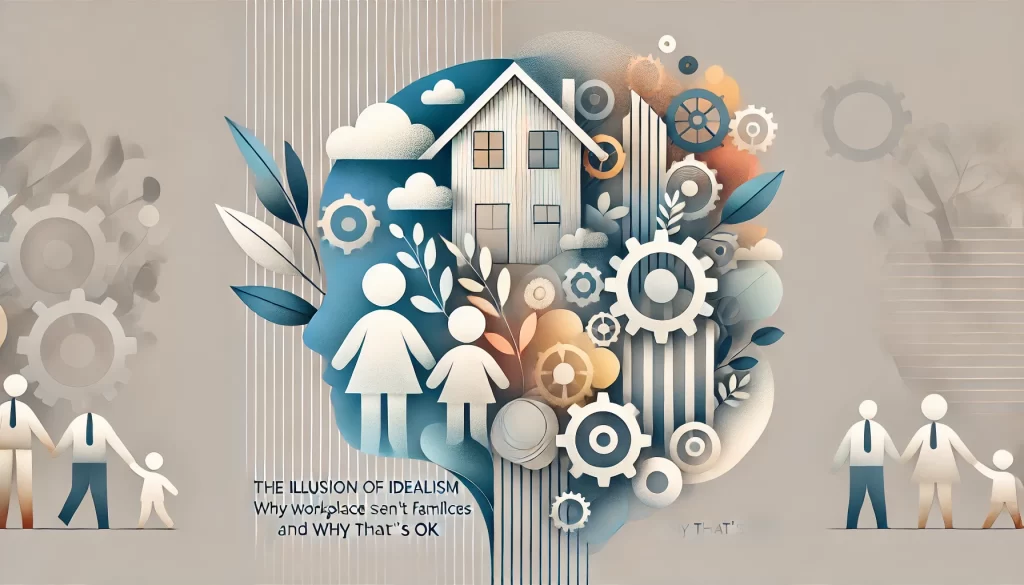
This morning, a LinkedIn post referencing a tweet from Adam Grant caught my attention. It talked about how workplaces are better seen as communities and should not be considered your family.
Reading through it, and reflecting on the idea, I felt compelled to sit down and write a response. There was something about the post, and the reactions it garnered, that struck me as too simplistic – too focused on feeding discontent rather than fostering meaningful dialogue about the nature of work and human relationships. So, here I am, exploring why such narratives miss the mark and what we should be talking about instead.
We live in an age of soundbites. Short, sharp, and often cynical, they flood our feeds, validating our frustrations and reinforcing our beliefs. Recently, a popular sentiment has made the rounds: “A company is not a family.” It’s an idea that strikes a chord with many disillusioned by layoffs, restructurings, and the impersonal grind of corporate life. But the problem with this narrative is its one-dimensionality. It paints workplaces as cold, transactional spaces devoid of humanity, while idealizing family life as some perfect oasis of unconditional love.
As someone who has spent decades navigating leadership, management, and people development, I find this commentary both reductive and misleading. It feeds into a growing cynicism, amplifying discontent without offering any real solutions. Worse, it overlooks a fundamental truth: families aren’t the romanticized units we want them to be, and workplaces aren’t the soulless corporations critics make them out to be.
Let’s start with the statement: “A company is not a family.” Well, of course not. But neither is a family the idyllic, conflict-free entity these influencers imply. Families are rife with dysfunction – power struggles, unmet expectations, egos, and transactional relationships. Yes, transactional. Families impose consequences just like companies do. It may not be as formal as a pink slip, but the emotional repercussions of failure in a family are real. Estrangement, exclusion, silent treatment – families do “fire” their members in their own way.
If we’re going to critique workplaces, we need to apply the same lens to families. Both are human collectives, and any human collective – whether it’s a family, a company, or a community – will face conflicts. This isn’t a reason for cynicism, but rather a call to embrace the complexities of human relationships.
The criticism that “families don’t fire for poor performance” misses this nuance. Families do impose consequences, just not in the same financial terms that companies must use to stay afloat. Companies, by their nature, have to make decisions based on profitability. That doesn’t make them evil or heartless; it makes them practical. If companies didn’t prioritize survival, none of us would have jobs in the first place.
The claim that “loyalty is one-way” in companies also needs to be unpacked. It’s easy to say “you’re replaceable” and dismiss the workplace as purely transactional, but this ignores a fundamental reality: workplaces, like families, thrive on relationships. While it’s true that no one is indispensable, that doesn’t mean relationships at work are devoid of meaning. People form deep connections, collaborate on meaningful projects, and experience personal growth. Dismissing this as merely a transaction devalues the human experience that exists within these spaces.
And then there’s the critique that “leaders choose the company over you.” Of course they do. That’s their job. But that doesn’t mean they’re choosing profits over people all the time. Leadership, like parenthood, is a balancing act – sometimes painful decisions have to be made for the greater good. Just as parents sometimes make decisions their children don’t like (or understand), leaders do the same in organizations. It’s not about betrayal; it’s about responsibility.
What these critiques miss is that real families aren’t perfect either. In fact, every family has its own dysfunctions. Why should companies be held to a higher, unrealistic standard? More importantly, these narratives rob individuals of their agency.
People choose where they work.
They decide what they value, what they’re willing to tolerate, and when it’s time to leave. In an era of unprecedented job mobility, people have more control over their work lives than ever before.
So why do these critiques get so much traction? Because they tap into our collective dissatisfaction. It’s easier to blame the system – whether that’s capitalism, corporate culture, or “the man” – than to confront our own role in shaping our work experience. And influencers know this. They capitalize on our frustrations because it’s profitable for them.
It’s easy content, but it’s not constructive.
Where are the conversations about how we can improve workplaces? Where are the discussions about shared responsibility between employers and employees to create environments that foster both productivity and well-being? Simply pointing out problems without offering solutions does nothing but reinforce negativity. It doesn’t help us grow.
If we truly want to make a difference in our workplaces – and our families – we need to embrace the messy, imperfect reality of human relationships. Dysfunction isn’t a corporate issue; it’s a human issue. The goal isn’t to eliminate conflict, but to manage it, to find ways to grow within it. It’s about learning how to navigate expectations, both at home and at work, and accepting that neither will ever be perfect.
The truth is, whether we’re talking about family or work, it’s the same story: effort, negotiation, compromise. The disappointments and challenges are inevitable, but so are the opportunities for connection, growth, and shared success. The key isn’t to romanticize one and demonize the other – it’s to recognize the common humanity in both.
No, a company isn’t a family. But that’s not a bad thing. It’s just another part of life, another space where we get to show up, contribute, and grow.
The real question is: how will you approach it?
Will you let cynicism define your experience, or will you help build something better?